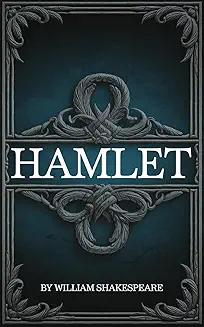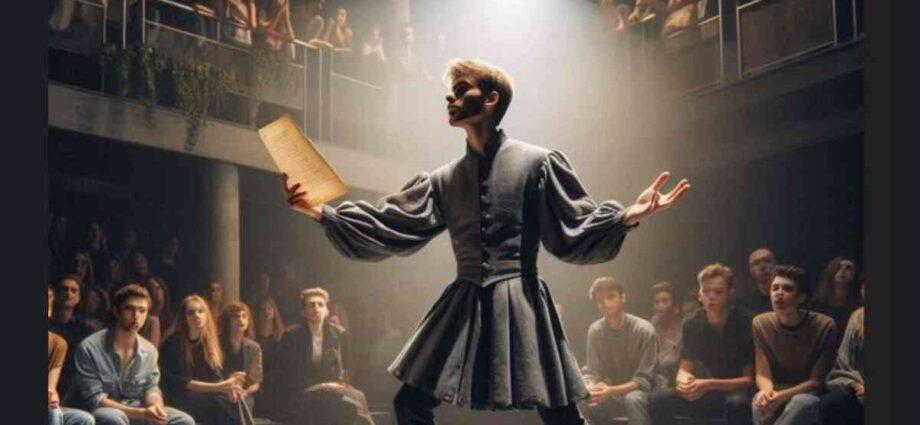“To be or not to be?” – the line that even non-theatre folk can’t escape! Whether it’s quoted in a cartoon, misused in a boardroom debate, or dramatically learned by heart by an aspiring Hamlet, it’s hard to come up with a more well-known quote.
Shakespeare’s most famous soliloquy has taken on a life of its own. But what does it really mean? And what can we learn from this today?
No. 2 – “To be or not to be: that is the question” – Hamlet, Prince of Denmark; Act 3, scene 1.

This article contains affiliate links
The context
Hamlet, Prince of Denmark is Shakespeare’s longest play, telling the unhappy story of a prince torn between a number of paths; avenging his father’s death, confronting his mother and feigning madness are amongst his choices as the scene begins. Hamlet has been through a lot. His father was murdered, and his uncle (whom Hamlet has been told is the murderer by the ghost of his late father) is now king. And to add insult to injury, his mother has married this uncle faster than you can say “I’m a woman in the 1500s and I don’t have many other options, so ‘I do!’” To top it all off, Hamlet has just learned that his friends are spying on him and his relationship has hit a rocky patch, so he’s working through a few too many trust issues as he enters this scene.
Imagine this: Hamlet, Denmark’s prince, clad in black (usually, but there’s room for interpretation here), steps forward and begins speaking – not to another character, but to himself (and, of course, to us, the audience). And just to clarify… this is NOT the speech where Hamlet holds the skull!
In this scene (Act 3, scene 1), Hamlet is at his breaking point. He feels the pressure and duty to do something but is not sure what. On the surface, in this quote, he is debating whether he should continue his painful existence or end it. Is it nobler to suffer or to fight back? These are heavy questions for a young man in his early twenties.
Some scholars argue that Hamlet isn’t just talking about life and death. He might be debating whether to act against Claudius or keep procrastinating. After all, over the years, Hamlet has been labelled as famously indecisive. Others debate whether Hamlet suspects that his uncle, Claudius and a courtier, Polonius are eavesdropping, adding another layer to Hamlet’s speech. Is he truly lost in thought, or is this a performance for his unseen audience to alert them to his suspicions?

What did Shakespeare really mean? Does it really matter?
Shakespeare, being the clever wordsmith he was, leaves the soliloquy open to interpretation. And isn’t it better that way? How dull would be all the essays on this speech if it was a cut-and-dried pondering? Since life can only be truly realised through the lens of our own perspective, this gives rise to the many interpretations of the written words.
Here are some of the most common ones:
- The classic view: Hamlet is contemplating suicide, weighed down by grief and existential dread
- The action vs. inaction debate: He’s not thinking about dying but about whether to take revenge or keep hesitating
- The political angle: Hamlet, aware that he’s being watched, is using this speech to subtly comment on the dangers of speaking out against power
So perhaps this is the real learning from this speech nowadays – that we will all interpret things based on our own experiences and values, and there is no ‘one truth’.
Whatever Shakespeare meant, what’s undeniable is that this soliloquy is relatable to many things in modern life. Who hasn’t faced a difficult decision and wondered whether it’s worth the fight?
Perhaps we need to consider these ideas more in the twenty-first century, as we face 2 major conflicts, a global trade crisis and the relentless march of technology rending much of what we presently do, redundant.
Or perhaps not? If only we knew the question…

Some ideas for teaching “To Be or Not to Be” in a drama classroom
Now for the fun part – getting students to experience this speech in fresh, engaging ways! Here are a few ideas, and the full speech is reproduced at the end of this article.
1. Performance challenge
Encourage students to perform the soliloquy in different tones:
- Hamlet as exhausted and hopeless
- Hamlet as frustrated and angry
- Hamlet as sarcastic and bitter
- Hamlet as cool and calculating
- Choose a modern-day character and repeat the speech as they might say it
Does the meaning change with each delivery?
2. Eavesdropping exercise
Pair up students: One plays Hamlet, and the other plays Claudius or Polonius, hiding and listening in.
How does it change the performance if Hamlet suspects someone is watching? What are the most important lines in this case?

3. Rewrite the soliloquy
Challenge students to:
- Translate the speech into modern language
- Turn it into a social media post (e.g., a Snapchat story or a TikTok monologue for example)
- Rewrite it as a breakup speech, a job resignation, or a political debate
By the end of the lesson, students should see that Shakespeare’s words aren’t just dusty old text but alive, relevant, and packed with drama!
The words versus the performance
Research has shown that we derive meaning only 7% from the words that we say. Far more important is the way we say them (our tone of voice for example), and our body language. We can say “I love you” in a thousand different ways, but they will not always mean that we are especially fond of the person we are talking to. Say it sarcastically, and it means the literal opposite of the words said.
To that end, and for a bit of light relief to brighten any Shakespeare drama class, I recommend you watch this extract from the stage of the Royal Shakespeare Theatre in Stratford-upon-Avon, to mark the life and work of William Shakespeare on the 400th anniversary of the playwright’s death on April 23rd, 2016. I’ve used this a lot to spark a debate about interpretation… see what you think.
Hamlet with Prince Charles and Benedict Cumberbatch | Shakespeare Live! From the RSC – BBC

Final thoughts
“To be or not to be” isn’t just a famous line – it’s a gateway to some of the deepest questions in life. Whether you see it as Hamlet’s existential crisis, a call to action, or just a piece of really good theatre, one thing is certain, this soliloquy is here to stay.
What’s your favourite way to teach this speech? Share your thoughts in the comments below!

Here is the soliloquy in full:
To be, or not to be, that is the question:
Whether ’tis nobler in the mind to suffer
The slings and arrows of outrageous fortune,
Or to take arms against a sea of troubles,
And by opposing end them: to die, to sleep
No more; and by a sleep, to say we end
The heart-ache, and the thousand natural shocks
That Flesh is heir to? ‘Tis a consummation
Devoutly to be wished. To die, to sleep,
To sleep, perchance to Dream; aye, there’s the rub,
For in that sleep of death, what dreams may come,
When we have shuffled off this mortal coil,
Must give us pause. There’s the respect
That makes Calamity of so long life:
For who would bear the Whips and Scorns of time,
The Oppressor’s wrong, the proud man’s contumely, [F: poore]
The pangs of despised Love, the law’s delay, [F: dispriz’d]
The insolence of office, and the spurns
That patient merit of th’unworthy takes,
When he himself might his Quietus make
With a bare Bodkin? Who would Fardels bear, [F: these Fardels]
To grunt and sweat under a weary life,
But that the dread of something after death,
The undiscovered country, from whose bourn
No traveller returns, puzzles the will,
And makes us rather bear those ills we have,
Than fly to others that we know not of?
Thus conscience does make cowards of us all,
And thus the native hue of Resolution
Is sicklied o’er, with the pale cast of Thought,
And enterprises of great pitch and moment, [F: pith]
With this regard their Currents turn awry, [F: away]
And lose the name of Action. Soft you now,
The fair Ophelia? Nymph, in thy Orisons
Be all my sins remember’d.
Related posts
Sunday Shakespeare 1: Nothing will come of nothing



I really appreciated how this article made me reflect on the timeless relevance of “To be or not to be”. It’s fascinating to see how a single soliloquy can open up so many layers of meaning whether it’s about existential dread, the struggle between action and inaction, or even subtle political commentary. Your discussion on different interpretations, from Hamlets inner turmoil to his awareness of being watched, really got me thinking about how we all face our own to be or not to be moments in life. It’s a reminder that Shakespeare’s words aren’t just relics of the past; they continue to resonate with our modern experiences and challenges. Thanks for sharing such an engaging and thought-provoking take!
Hi Dan. Thank you for your kind comments on the article and I’m so pleased you found it thought-provoking. I totally agree that these ideas and concepts can speak to a modern audience even though they are over 400 years old. It just shows how the human condition is still struggling with many aspects of existence still. This is how I try to teach these concepts to my students, so they begin to recognise, as you did, that they are still relevant and meaningful today. Even in a digital and globally connected world, human beings can still feel lots, insecure and disillusioned – perhaps more so than in the past. But that’s a whole other story. 🙂